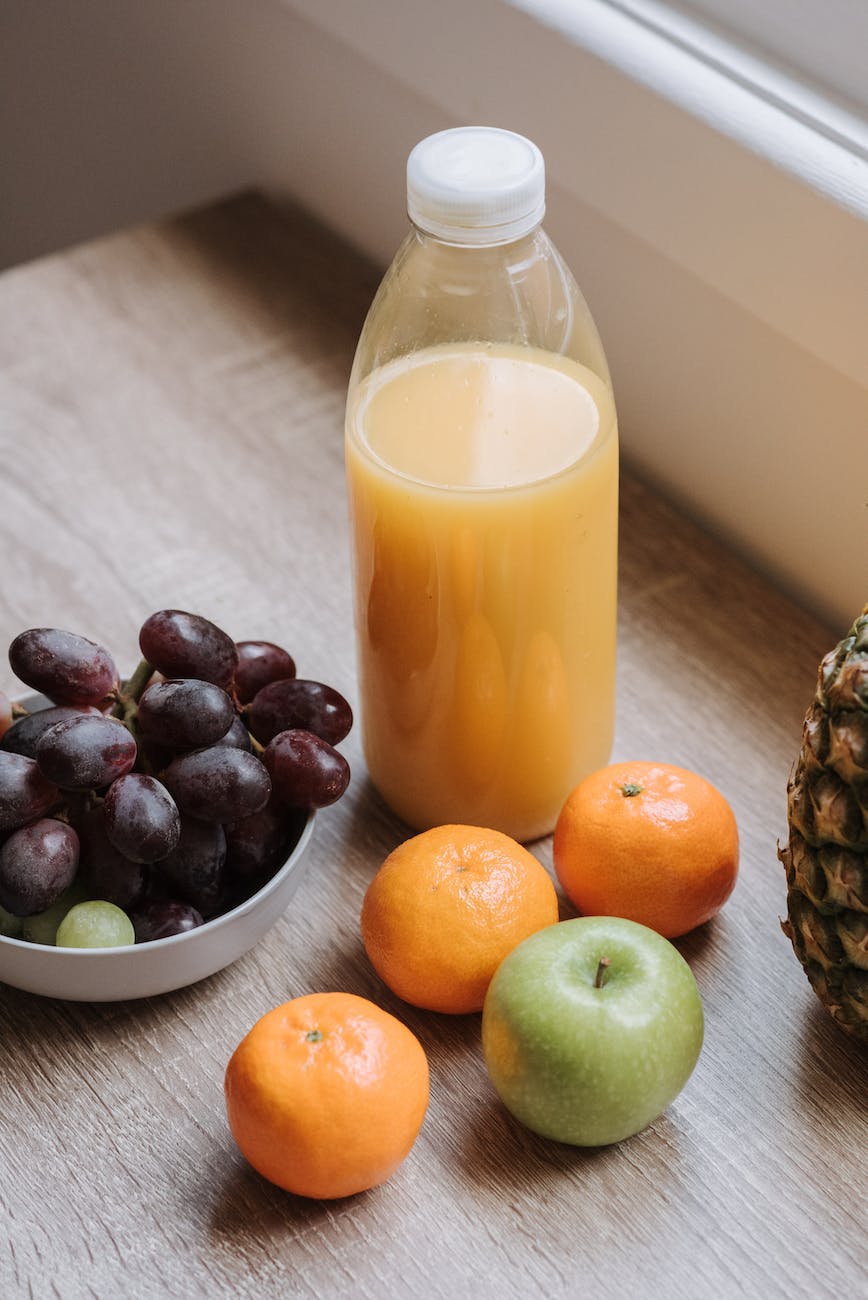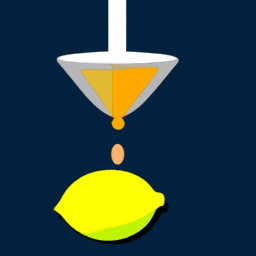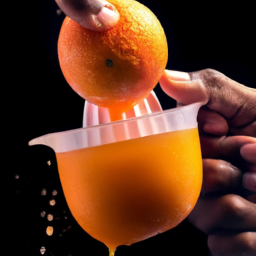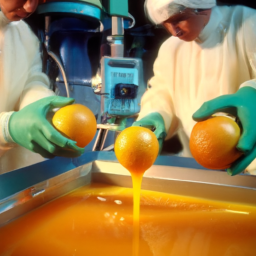Are you often craving something wholesome and nourishing? Do you like juices or smoothies but aren’t sure which one is the healthiest choice for you? If this sounds like you, it’s time to learn about the benefits of cold pressed juice compared to regular juice.
Cold pressed juices are becoming increasingly popular in the wellness world, with many claiming them to be healthier than regular juices. But what exactly makes them different from ‘normal’ juices? Is there really any benefit to drinking cold-pressed instead of regular juice? In this article we’ll explore these questions, so keep reading!
It all comes down to how the two types of juice are made. Cold pressing uses hydraulic presses rather than blades or high speed centrifugal extraction methods used by traditional juicers.
This results in a higher quality product with more nutrients intact compared to regular store bought fruit juices. Plus, because less air is introduced into the process, cold pressed juices have a longer shelf life and fresher taste too. So you can see why they’re quickly becoming a go-to choice for those looking for a healthy beverage option.
Cold pressed juice is like a beautiful painting on canvas, capturing the vibrant colors and flavors of nature. It’s an artful representation of fresh fruits and vegetables that can be enjoyed in liquid form.
Cold pressing is a method of extracting juice from fruits and vegetables without using heat or pasteurization, resulting in a product with superior nutritional value compared to traditional juicing methods. This process uses hydraulic pressure to extract all the vital nutrients and enzymes contained within the produce without destroying them through oxidation or high temperatures.
By cold-pressing ingredients instead of blending, it allows for maximum nutrient retention while preserving flavor and texture – something that would otherwise be sacrificed when using other forms of extraction. With its unique combination of health benefits, convenience, and deliciousness, cold-pressed juice truly stands out as one of the best ways to get your daily dose of vitamins, minerals, and antioxidants.
The cold-pressing process involves crushing whole fruits and vegetables into pulp before putting it under extreme pressure over time to release the natural juices within. Unlike traditional centrifugal juicers that rely on blades rotating at high speeds (which generates heat), cold press machines use slow masticating augers which grind up ingredients at low speeds so no heat is generated during the extraction process.
This preserves the delicate enzymes found in fresh produce which are essential for good digestion and overall health. The end result is a smooth organic juice packed full of beneficial compounds that you can enjoy guilt free!
Process Of Producing Cold Pressed Juice
The process of making cold pressed juice is quite different from conventional methods. Unlike regular juices that use high-speed blades to break down fruits and vegetables, cold pressed juices are created with a hydraulic press that gently extracts the nutrients without reducing them to pulp or puree. This means that all the vitamins, minerals, enzymes and antioxidants remain intact in the finished product.
The preparation for cold pressing involves washing the produce thoroughly before slicing it into small pieces which are then put into a chamber where they’re compressed at a very low speed with thousands of pounds of pressure. Once this process has been completed, the extracted liquid is strained several times until all unwanted particles have been removed. Finally, what remains is nutrient dense and delicious cold pressed juice!
Nutritional Benefits Of Cold Pressed Juice
The nutritional benefits of cold pressed juice are clear. Unlike normal juices, which often have added sugars or preservatives, cold-pressed juices contain only natural ingredients and retain their vitamins, minerals, enzymes and antioxidants due to the minimal processing involved in making them. This means that these nutrients stay intact for longer periods of time compared to other types of juice. Cold-pressed juices also typically contain more fiber than traditional juices since they don’t undergo high speed blending processes.
Additionally, because the fruits and vegetables used to make cold-pressed juices aren’t heated during production, they can retain up to five times more vitamins and minerals than standard pasteurized products.
As a result of all this nutrition staying locked into the product, consuming cold pressed juice on a regular basis helps you get your daily recommended servings of fruit and vegetables without having to eat large quantities at once—a benefit those watching their weight will appreciate! Furthermore, drinking cold pressed juice may help reduce inflammation in the body by providing high levels of antioxidants and phytochemicals like polyphenols. Finally, it is important to note that many people report feeling energized after drinking cold pressed juice due to its nutrient density as well as its ability to be easily digested by the body.
Definition Of Normal Juice
Normal juice, also known as conventional, usual, traditional and ordinary juice is the type of juice most often found in grocery stores. To understand what makes normal juice different from cold-pressed juices, it’s important to look at how it’s made.
First off, let’s consider a typical example: Orange Juice. When creating normal orange juice, oranges are harvested and then sent to a processing plant where they’re washed and pasteurized before being juiced or squeezed into oblivion. The result is an orange drink that can last longer on shelves than its fresh counterpart and has fewer nutrients due to heat damage caused by pasteurization process.
Another difference between cold-pressed juices and regular juices is their sugar content. Since there’s no added sugar in cold-pressed juices, you don’t have to worry about consuming too much artificial sweeteners which may lead to weight gain or other health issues such as diabetes over time. On the contrary, conventional orange juice usually contains more natural sugars than other fruit drinks because manufacturers add them for taste enhancement purposes.
In short, while both types of juices offer some nutritional benefits depending on the ingredients used in production; normal juice tends to be sweeter with less overall vitamins & minerals compared to cold pressed varieties due various processes involved in making them shelf stable.
As we move onto discussing the process of producing normal juice, one thing remains clear; knowing the differences between these two types of beverages could help us make better decisions when purchasing our favorite brands!
Process Of Producing Normal Juice
Producing normal juice involves using a juicing machine to extract liquid from fruits and vegetables. This traditional method of juicing usually results in cloudy or opaque juices that contain some pulp, which is made up of insoluble dietary fiber. The extracted juice then goes through a pasteurization process to kill off any potentially harmful bacteria before it can be bottled and sold as store-bought juice.
The main difference between cold-pressed juice and normal juice lies in the way they are produced. Cold pressing preserves more nutrients because it does not involve heat or oxidation. Instead, this method uses an industrial hydraulic press to extract all the natural goodness from the produce with minimal damage caused by friction or heat.
As such, cold-pressed juice has a longer shelf life than regular juice due to its lack of oxidation, meaning no preservatives are needed for storage purposes. Additionally, it contains higher amounts of vitamins, minerals, antioxidants and enzymes compared to regular juices which have been exposed to air and light during production.
Ultimately, when choosing between cold pressed juice and normal juice one should consider their individual health needs – while both offer nutritional benefits, only cold pressed retains more essential nutrients per serving without relying on artificial additives for preservation purposes.
Nutritional Benefits Of Normal Juice
Normal juice is an excellent source of essential vitamins and minerals. It contains a wide variety of vitamins, including vitamin A, C, B complex and E. When it comes to minerals, normal juice can provide calcium, magnesium, iron, zinc and phosphorus. The natural antioxidants found in normal juice are also beneficial for overall health. These powerful compounds help protect the body from free radical damage that can lead to degenerative diseases like cancer.
In addition to providing key nutrients, drinking normal juice may also offer other benefits. Studies have shown that regular consumption of fruit juices has been linked with improved immune system function and reduced risk of certain chronic illnesses such as heart disease and diabetes.
Drinking normal juice can also help reduce blood pressure levels due to its high potassium content. Plus, because it’s made from whole fruits or vegetables, you get all the dietary fiber they contain too!
When looking at the nutritional profile of normal juice versus cold-pressed varieties there are some clear distinctions between them; however both types can be healthy options when consumed in moderation. For those who want more nutrition per glassful – especially regarding antioxidant power– cold-pressed juices might be a better choice than traditional ones as they tend to retain more vital vitamins and minerals during processing.
Comparison Between The Two Types Of Juices
There is a distinct difference between cold-pressed juice and normal juice. Cold-pressed juices are made using special equipment, which squeezes the produce at low temperatures to keep it fresh and preserve its nutrients.
Normal juice, on the other hand, is made by blending or grinding up fruits or vegetables into a liquid form. Here’s a breakdown of how these two types of juices differ in terms of their nutritional benefits:
- Nutritional Benefits: Cold-pressed juices typically have more vitamins, minerals, antioxidants and enzymes than regular juices due to the process used to make them. The slow juicing process also helps retain more fiber from the fruits and vegetables compared to traditional blending methods for regular juices.
- Shelf Life: Cold-pressed juices usually have a much longer shelf life than regular juice because they’re produced under specific conditions that help prevent spoilage. On average, most brands can last anywhere between 5 days and 2 weeks if stored correctly in an airtight container within your refrigerator. Regular juices, however, tend not to last as long since they don’t contain preservatives like cold-pressed juices do; they need to be consumed quickly after being prepared in order to avoid any potential foodborne illnesses.
Cost Comparison: Cold-pressed juices tend to cost more per bottle than regular fruit or vegetable juice but you get what you pay for! While both offer great nutritional value when consumed regularly, cold-pressed juices provide superior quality ingredients with higher levels of vital nutrients such as vitamins A & C, folate, calcium and iron – all essential for maintaining good health!
When considering whether cold pressed juice or normal juice is healthier for you nutritionally speaking, it really comes down to personal preference – there are pros and cons associated with each type of drink depending on individual needs and goals. However one thing remains clear – both options provide valuable nutrition so next we’ll take a look at shelf life and storage considerations for each type of juice before making our decision about which option is best suited for us!
Shelf Life And Storage Considerations
When it comes to shelf life and storage considerations, cold pressed juice and normal juice differ significantly. Cold pressed juices typically have a much longer shelf life than regular juices because they are extracted using pressure rather than heat or additives like preservatives. This means that cold pressed juices can last up to 3 days when stored correctly in the refrigerator, while regular juices should be consumed within 24 hours of purchase for optimal freshness.
In terms of storage, both types of juice need to be refrigerated at all times. However, due to its higher nutrient content, cold pressed juice needs to be kept away from direct sunlight when storing it in the fridge or pantry. As with any food product, make sure your cold-pressed juice is well sealed before being placed into storage. Normal juices also require proper sealing but may not necessarily need to be protected from light exposure as long as temperatures remain cool enough for safe consumption.
These differences in shelf life and storage requirements should be taken into account when choosing between cold-pressed vs. regular juices; particularly if you’re looking for convenience and longevity in your juicing routine. Now let’s look at the cost comparison between these two types of juices.
Cost Comparison Between The Two Types
When it comes to the cost of cold pressed juice and normal juice, there is a significant difference. Cold pressed juices are usually more expensive than regular juices because they involve additional processes like pressing and straining. This means that manufacturers must invest in specialized machinery and labor costs which result in higher prices for consumers.
Normal juices on the other hand generally require less equipment, fewer steps, and therefore are much cheaper than cold-pressed varieties. The price differences between the two types can range from $2-$4 per bottle depending on the brand and type of juice being purchased. So if you’re looking for an affordable option, then purchasing normal juice may be your best bet.
However, when considering overall value, cold pressed juices provide greater nutritional benefits due to their lack of added sugars or preservatives making them a better investment over time despite their higher upfront costs. Therefore, if you’re looking for something with lasting health benefits then investing in cold pressed juice might be worth it.
Moving forward let’s consider how these different types of juices can be used differently by consumers…
Suggested Uses For Each Type
Cold-pressed juice and normal juice have distinct uses. Cold-pressed juice is ideal for those looking to maximize their daily nutrient intake, as it preserves more of the nutrition from fruits and vegetables than regular juices do. It can also be used for detoxification purposes by consuming only cold-pressed juices for a period of time. On the other hand, normal juice is best suited for creating recipes that require a bit more sweetness or flavor enhancement. With its higher sugar content, it blends well with creamy ingredients like milk or yogurt in smoothies and shakes.
When considering recipes featuring either type of juice, it’s important to consider the nutritional value they offer. For example, cold-pressed juice recipes often contain multiple servings of fruits and vegetables in one single serving. This means you’re getting an abundance of vitamins, minerals, and antioxidants without having to consume large amounts of food at once!
Normal juice drinks are typically not nutritionally dense but still provide some vitamins and minerals when enjoyed in moderation with other healthy foods. Additionally, these can be great options for meals on-the-go such as breakfast smoothies or post workout recovery drinks.
For creative ideas using cold-pressed juices, try adding them into sauces or marinades for meats like chicken breasts or lean steak cuts. In addition, mix them up with your favorite herbs and spices for added flavor – think garlic powder, oregano or chili flakes!
For normal juices which tend to be sweeter in taste, use them as part of baking recipes such as muffins or cakes – just remember to cut back on the amount of added sugars if possible! You could even add both types into cocktails or mocktails depending on what kind of end result you’re aiming for: whether sweet and tangy flavors or something more subtle yet refreshingly tart!
Frequently Asked Questions
Are There Any Health Risks Associated With Drinking Cold Pressed Juice?
When it comes to understanding the health risks associated with drinking cold pressed juice, it’s important to be aware of what you’re consuming. Cold-pressed juices have become increasingly popular as a way to get in more nutrients and vitamins, but is there any safety risk when drinking them? To better understand potential health hazards from cold pressed juice, let’s take a look at their differences from normal juices and the possible health consequences that could occur if consumed regularly.
The main difference between cold-pressed juice and regular fruit or vegetable juice lies in how each type is made. Cold-pressed juicers use hydraulic pressure to extract the liquid from fruits, vegetables, and herbs – which preserves key vitamins, minerals and antioxidants that can otherwise be lost during traditional methods of juicing like blending or grinding.
This nutrient preservation makes cold-pressed juicing an attractive choice for people looking to increase their intake of natural ingredients while avoiding unhealthy additives found in processed drinks. However, because this method also extracts more sugar than other types of juicing, it’s important to consider the added calories that come along with its consumption.
Another factor that should be taken into account when considering the safety of cold pressed juice is storage time; since they are not pasteurized like most store-bought beverages, these juices must be refrigerated within 30 minutes after extraction (or even quicker depending on the temperature).
If left unrefrigerated too long due to poor handling practices or careless transportation processes, bacteria growth can occur – leading to food poisoning symptoms such as diarrhea and vomiting if ingested. Additionally, people who suffer from weakened immune systems may want to avoid consuming cold-pressed juices altogether due to their high levels of natural sugars and lack of preservatives.
Although some health risks exist when drinking cold pressed juice due its unpasteurized nature combined with potential mishandling issues throughout production processes, overall it remains an appealing option for those seeking out healthier beverage options packed full of essential vitamins and minerals without added preservatives or artificial flavors commonly found in many store bought items today. For those wishing to try out this nutritious alternative safely however – proper hygiene practices should always be observed when storing and serving these drinks – ensuring maximum freshness upon delivery so all consumers can enjoy this amazing source of nutrition worry free!
Does Cold Pressed Juice Contain More Vitamins And Minerals Than Regular Juice?
When it comes to nutrient content, there is a difference between cold pressed juice and regular juice. Cold-pressed juices are generally considered more nutritious because they typically contain higher concentrations of vitamins, minerals, and antioxidants than regular juice. It’s important to note that not all cold-pressed juices have more vitamins or minerals than regular juicers – this varies depending on the ingredients used in each type of juice.
Cold-pressed juices usually retain more of their natural vitamins due to the lower temperatures involved in the production process. This means that the original nutritional profile preserved during pressing is retained throughout processing without any additional heat exposure which can damage beneficial nutrients. The result is a product with higher levels of beneficial compounds like vitamin C and carotenoids which provide antioxidant protection from free radical damage as well as other health benefits associated with these micronutrients.
Regularly produced juices often rely heavily on additives for flavor enhancement, shelf stability, and color correction which may reduce some of its inherent nutrition value. In comparison, many cold-pressed juices use organic produce sources combined with minimal added sweeteners for flavor balance resulting in products packed full of powerful phytonutrients and live enzymes capable of providing an array of health benefits when consumed regularly.
For those looking to boost their daily intake of essential vitamins and minerals while also enjoying delicious flavors, cold-pressed juice offers an excellent option. While every drinker’s individual needs will vary based on lifestyle factors such as activity level or dietary restrictions, investing in quality cold press juice can be a great way to ensure optimal nutrient absorption while still enjoying great taste too!
Are Cold Pressed Juices Pasteurized?
Have you ever heard of cold-pressed juices? If so, you may have asked yourself whether they are pasteurized. The answer is that it depends on the juice. Cold-pressed juices can be both pasteurized and unpasteurized. To understand why this matters for your health, let’s explore what makes them different from regular juices and how to identify which kind you’re drinking:
First off, cold-pressed juices differ from traditional juices in terms of their process. Traditional juices are made by crushing, squeezing or blending fruits or vegetables into a liquid. Cold-pressed juices use hydraulic pressure instead to extract the liquid from the produce – meaning no heat is used – resulting in higher levels of vitamins and minerals.
Pasteurization is an important factor when deciding between these two kinds of juice because it reduces the risks associated with ingesting raw fruit and vegetable juice. Pasteurization kills most microorganisms present in the juice which could potentially cause illnesses such as salmonellosis and E. coli infection if consumed unpasteurized. Here are some key points to consider:
- Unpasteurized cold-pressed juices should be stored in a fridge once opened (or within hours) to keep them fresh and safe to drink;
- Even though many pasteurized products don’t need refrigeration until after opening, always make sure you check the label before purchasing;
- Be aware that even when pasteurized, there is still a risk of contamination due to handling errors during production;
- Avoid buying large amounts of any type of juice unless you plan for using it up quickly (within 3 days).
So now we know that cold-pressed juices can either be pasteurized or unpasteurized – but how do we tell which one we’re consuming? It’s simple – just read the label! Most companies will clearly state whether their product has been treated for safety purposes along with other nutritional information about their juice such as ingredients, calorie count etc. Ultimately, understanding what goes into our diet helps us make informed decisions about our health – so next time you buy a beverage full of nutrients like cold pressed juice, make sure you check out those labels!
Is Cold Pressed Juice Better Than Regular Juice For Weight Loss?
When it comes to weight loss, you may be wondering which type of juice is best for your body: cold pressed or regular? While both offer health benefits and nutrition value, there are a few key differences between the two.
First off, let’s discuss what makes cold-pressed juices unique. Cold pressing refers to the process of extracting juice from fruits and vegetables at low temperatures without using additional heat or oxygen. This means that they retain more nutrients than regular juices since there’s less oxidation in the process. Additionally, cold-pressed juices tend to have a higher concentration of vitamins and minerals due to their higher nutrient content as a result of minimal processing involved.
On the other hand, regular juices use high levels of heat during pasteurization—a process used to kill bacteria—which can strip away some nutritional value from them. Plus, because regular juices generally contain added preservatives or sugars, they don’t provide nearly as much fiber as compared to those made with cold press methods. That said, when trying to lose weight through juicing, opting for cold pressed over regular could help boost your efforts given its relatively better nutrition quality and lack of additives.
It’s important to note though that no matter which juice you choose, proper dieting and exercise should still form part of any successful weight loss program if you really want results!
Is Cold Pressed Juice More Expensive Than Regular Juice?
When it comes to juicing, you may be wondering about the differences between cold pressed juice and regular juice. Is one more expensive than the other? It can depend on where you purchase your juices from, but in general, cold pressed juice tends to cost a bit more due to its higher quality standards.
Cold-pressed juice is made by slowly pressing fresh fruits and vegetables, as opposed to heat pasteurizing or blending them together like with traditional juices. This method helps preserve all of the natural nutrients found in the produce, giving you an incredibly nutrient-dense drink that’s both healthy and delicious! However, this also means that it takes longer (and requires more energy) to make each bottle of cold-pressed juice – so it often costs more than regular juices.
The price difference between these two types of juices really depends on what kind of produce you’re using and how much effort goes into making them. If you buy pre-made cold press juice at a store or online, then expect to pay a premium for convenience.
On the other hand, if you make your own cold press juice at home using high-quality ingredients, then it won’t necessarily have to break your budget compared to regular store bought varieties. All in all, whether you opt for cold pressed or regular juice will come down to your individual needs and preferences when it comes to nutrition and taste.
No matter which type of juice fits best with your lifestyle, there are plenty of options out there for those looking for tasty alternatives that offer extra health benefits too! Whatever choice you make regarding different types of juices should keep both cost and nutritional value in mind before buying in order get the most bang for your buck!
Conclusion
In conclusion, cold pressed juice is a great way to get more vitamins and minerals into your diet without sacrificing flavor. While it may be slightly more expensive than regular juices, you can rest assured that the quality of nutrition you’re getting from cold pressed juice makes up for the cost difference.
However, some people may worry about potential health risks associated with drinking cold pressed juice. It’s important to note that there are no known risks when it comes to consuming this type of juice if you buy from a reputable source. Cold pressed juices are not pasteurized, so it is best to consume them within three days of purchase in order to avoid any foodborne illnesses.
Overall, cold pressed juices offer an array of nutritional benefits—from providing additional nutrients like vitamins and minerals to aiding weight loss goals due to their low-calorie content—making them worth considering as part of a healthy lifestyle plan. So why not give it a try? You might just find yourself reaching for those leafy greens instead of sugary drinks!









